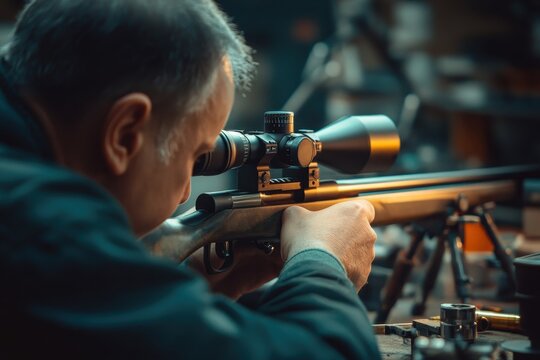
Gunsmithing is a skilled and rewarding career that involves the design, repair, and maintenance of firearms. Whether you are interested in restoring vintage weapons or working with law enforcement agencies to maintain their firearms, gunsmithing offers a wide range of opportunities. However, this career requires more than just a passion for firearms—it demands extensive training and knowledge in various areas of mechanical engineering, safety protocols, and the legalities surrounding firearms.
The Path To Becoming A Gunsmith
Learning the necessary abilities and information is the first step to establishing a prosperous career in gunsmithing. Gunsmiths must be proficient in the inner workings of firearms, which includes knowledge of both handguns and long guns, as well as an understanding of how to troubleshoot, repair, and modify them. Additionally, gunsmiths must also be adept in the various tools and technologies used in the field, such as machines for metalworking and woodworking, welding equipment, and specialized firearm tools.
While some people enter the field through self-study or informal apprenticeships, formal education is typically the best route for those who are serious about a career in gunsmithing. Numerous recognized universities and institutes provide courses specially tailored for those who want to become gunsmiths. These programs offer a well-organized curriculum that addresses the field’s theoretical and practical facets. Students learn how to disassemble, repair, and reassemble firearms, understand firearm safety, and master machining techniques, woodworking, and other essential skills.
One notable training opportunity for individuals interested in gunsmithing is the Law Enforcement Armorers Course. This specialized training is perfect for those who want to work with law enforcement agencies and military units, maintaining and repairing their firearms to ensure peak performance. The course is a great option for anyone who wishes to develop specialized knowledge in this field because it concentrates on the particular requirements and features of law enforcement weaponry.
If you’re wondering how to get into gunsmithing, the first step is to pursue specialized gunsmith training that focuses on the technical skills needed to work with firearms. Whether through formal education or apprenticeships, this training will help you develop the technical expertise required to excel in the field. For those looking to advance their careers, obtaining a professional armorer certification is a valuable asset, as it demonstrates a high level of proficiency and knowledge. This certification often focuses on the specific needs of law enforcement or military firearms, further enhancing your qualifications and career prospects in the gunsmithing industry.
What You Will Learn In Gunsmithing Training?
Training in gunsmithing covers several key areas. First, students will need to understand the various types of firearms, their components, and their functions. This includes both mechanical and modern firearm systems, such as semi-automatics, revolvers, rifles, shotguns, and automatic firearms. Understanding how each part interacts with the others is crucial to diagnosing and repairing any issues.
Another essential area of training is metalworking. Many gunsmiths work with metal components, requiring proficiency in machining, forging, and heat treatment techniques. These processes are necessary when modifying or restoring firearms, ensuring that parts fit perfectly and operate safely. Gunsmiths also need to have a working knowledge of ballistics, as this helps them understand how firearms perform in different conditions.
Additionally, students will be taught how to deal with the legal requirements of working with firearms. This involves understanding federal and state laws, gun ownership regulations, and safety protocols. In many places, gunsmiths must also hold licenses to operate legally, ensuring they adhere to all necessary safety measures and laws regarding firearm repairs and sales.
On-The-Job Experience And Certifications
A solid foundation is provided by formal education, but practical experience is also essential for becoming a competent gunsmith. Many aspiring gunsmiths pursue internships, apprenticeships, or work with established shops to gain practical experience. They can further hone their abilities and expand their professional network in these roles by applying what they have learned in the classroom to real-world scenarios.
Certifications are another important aspect of professional development in gunsmithing. After completing formal training, gunsmiths can pursue various certifications that validate their expertise and increase their credibility in the field. One such certification is the Certified Professional Gunsmith designation, offered by the National Rifle Association (NRA), which can help gunsmiths stand out in a competitive job market.
Career Opportunities In Gunsmithing
Once you have completed your training and earned any relevant certifications, you will find a variety of career opportunities in the gunsmithing field. Many gunsmiths start their own businesses, offering repair and customization services for firearms. Others may work for law enforcement agencies, military units, or firearm manufacturers, ensuring that firearms are properly maintained and function effectively.
In addition, gunsmithing skills are often needed in the hunting, sporting, and recreational firearm industries, which provide further career opportunities. Whether you are interested in designing custom firearms, restoring antique pieces, or specializing in law enforcement armory, the possibilities are extensive.
ConclusionBuilding a career in gunsmithing requires a blend of technical skill, creativity, and commitment to ongoing learning. By pursuing formal education, gaining hands-on experience, and obtaining relevant certifications, you can lay a strong foundation for success in this rewarding field. Whether you’re working with the latest models or restoring historical firearms, gunsmithing offers a career filled with diverse challenges and opportunities.
